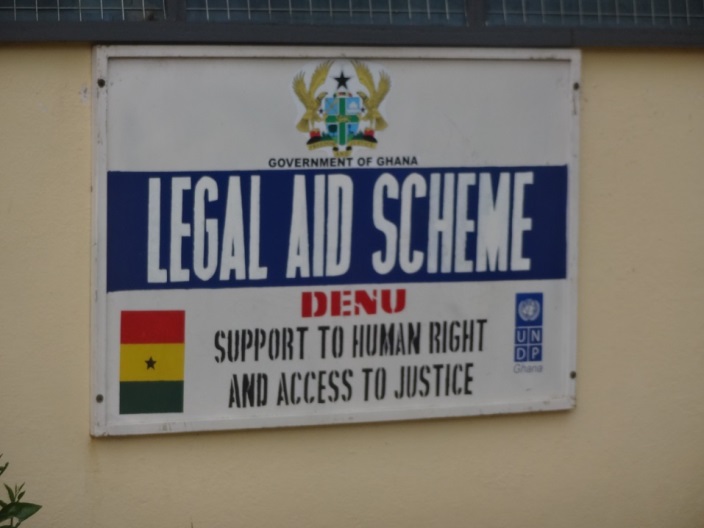By: Jim Ransdell
Jim Ransdell, 2L, interned at Legal Resources Centre in Accra, Ghana during the Summer of 2014 as part of Washington University School of Law’s Global Public Interest Law Fellows Internship Program. This is the first in a series of posts by Jim where he shares his experiences and observations working in a foreign legal system.
Impressions of Ghanaian legal education
Ghana is a democratic country located along the West African coast which was a British colony from 1867 until 1957, when Ghana became the first country in Sub-Saharan Africa to regain its independence. In recent years, Ghana has experienced strong economic growth and political stability. Building on these successes, Ghanaians are seeking to expand citizens’ access to justice.
Ghana’s legal education system is transitioning toward a four year undergraduate degree in law (LLB), followed by a two year graduate degree in law. Graduate admission is strictly limited to around 180-200 students per year. Beyond pure competition for these seats, educational affordability is a serious issue. The ¢8,500 (GHC) / $2600 (USD) price tag of a graduate degree in law is beyond the average Ghanaian’s means.
According to a hotel proprietor I spoke with, the problem with accessing a legal education is not only money, but power. If one wants to become a lawyer, he said, they need political connections to get their name on the right list. Otherwise, their application will likely go nowhere.
Public perception aside, Ghana’s actual capacity to train new lawyers is limited. There is but one professional legal training institution in Ghana, The Ghana School of Law. Prior to its opening in 1958, all lawyers in Ghana were trained abroad. For the school’s first fifty years, the only place to obtain a Barristers of Law degree was the Makola campus in Accra, Ghana’s capital. This main campus is housed in an annex to the Ghanaian Supreme Court. In 2009 a much needed second campus, supporting sixty students, was opened in Kumasi. Later, a third campus was established in Legon, a suburb of Accra. Having been exposed to common law traditions while under English colonial rule, Ghanaian legal curriculum is, in many respects, similar to that in American and British law schools.
The Ghana Bar Association [GBA] estimates that Ghana has roughly 2,500 lawyers in practice serving a population of 25.5 million. Lawyers compose about 0.01% of the Ghanaian population, compared to about 0.4% of the US population, which is the highest in the world (and arguably many more than necessary). Beyond sheer numbers, the GBA, of which all lawyers trained in Ghana are customarily members, has noted a need for lawyers with a greater diversity of training.
Paralegal Training
 To compensate for this dearth of lawyers in Ghana, both Legal Resources Centre [LRC] and FIDA-Ghana train volunteer community paralegals in rural and underserved areas of the country, particularly the north. “Ghanaian law” is comprised of formal, legislative law, as well as non-formal, customary laws. Where national government institutions are less visible or accessible, disputes are often resolved exclusively according to customary law. Volunteer paralegals, as residents of the communities in which they operate, understand customary laws mores, but are trained in Ghana’s formal legal requirements by the LRC. A secondary aim of this training program is to increase the use and awareness of Ghana’s formal justice system.
To compensate for this dearth of lawyers in Ghana, both Legal Resources Centre [LRC] and FIDA-Ghana train volunteer community paralegals in rural and underserved areas of the country, particularly the north. “Ghanaian law” is comprised of formal, legislative law, as well as non-formal, customary laws. Where national government institutions are less visible or accessible, disputes are often resolved exclusively according to customary law. Volunteer paralegals, as residents of the communities in which they operate, understand customary laws mores, but are trained in Ghana’s formal legal requirements by the LRC. A secondary aim of this training program is to increase the use and awareness of Ghana’s formal justice system.
I was quite surprised by what ‘paralegal’ means in the Ghanaian context. Shortly after beginning work at the LRC, we certified a group of new paralegals following a 1.5 day training session run by the LRC’s Executive Director Nabila, herself a lawyer. However, teaching materials for these paralegals had been prepared by interns, including myself. Interestingly, in pre-training surveys, participants themselves seemed to think of paralegals in a way similar to the American conception, as one who assists a lawyer and can themselves undertake simple legal processes.
For the LRC, however, the desired result is instead to have someone familiar with legal rights (especially those concerning women and children), who can point aggrieved parties in the right direction when a conflict arises. In essence, becoming a ‘paralegal’ is mostly about empowerment, even if the paralegals can take very little legal action.
